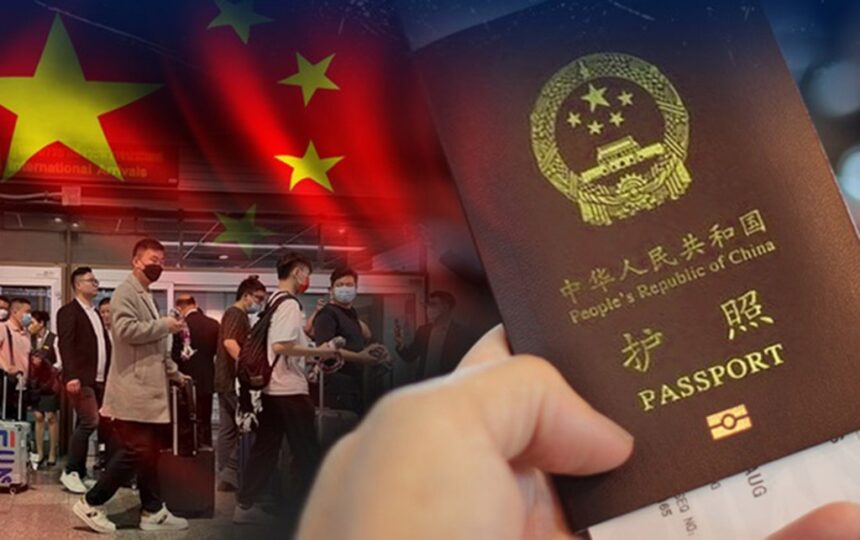BANGKOK — Thailand will shorten the visa-free stay for visitors from 93 countries, bringing the maximum from 60 days back down to 30 days, after serial abuse by illegal Chinese tour operators entering Thailand to work undocumented.
The Tourism and Sports Ministry announced the change, aiming to stop unauthorised Chinese tour operators from misusing the current system. This update hopes to protect local businesses without hurting the country’s popularity with tourists. From May 2025, all travellers will also need to complete a Digital Arrival Card before entering Thailand.
Thailand’s Visa Policy Change
Since July 2024, travellers from 93 countries—like the US, UK, and China—have been allowed to visit Thailand without a visa for up to 60 days. This was an increase from the previous 30-day limit and was meant to help the tourism industry recover after the pandemic. The extension attracted more long-term visitors, such as digital nomads.
But in March 2025, Minister Sorawong Thienthong said the government would return to a 30-day visa-free stay. Local tourism groups had raised concerns about illegal business activities, especially from those using the longer stay to work without permits.
Sorawong explained that most tourists only visit for two to three weeks. The extended stay was mainly helping people who wanted to work illegally, not genuine travellers. While there’s no set date for the change yet, officials are talking with industry partners about when it should start.
Tourism data supports the shift. Most long-haul tourists stay 14 to 21 days, and short-haul visitors usually stay less than a week. The ministry says the plan is to keep Thailand open for tourism but tighten controls where needed.
Illegal Chinese Tour Operators
One of the main reasons for the policy update is the growing number of illegal Chinese tour businesses. Local operators have reported more foreign-run companies entering the market, putting pressure on Thai firms. Many of these businesses use Thai citizens as nominees on paper to get around strict ownership rules, which is against the law.
The Association of Thai Travel Agents says these operators offer cheaper tours by skipping taxes and required permits. This practice makes it hard for legitimate companies to compete. President Sisdivachr Cheewarattanaporn called for stronger rules to stop illegal operators from hurting the industry.
Earlier in 2025, the Tourism Authority of Thailand (TAT) considered cutting the visa-free stay for Chinese visitors to 10 or 15 days. TAT Governor Thapanee Kiatphaibool pointed out that most Chinese tourists already stay just 7 to 10 days.
However, TAT decided against removing visa-free status because it brought in 6.73 million Chinese visitors in 2024, with a goal of 8 million for 2025.
Police Chief Pol. Gen. Kittirat Panpetch ordered more security at border points, especially in areas like Mae Sot, which sees many illegal crossings. He promised to look after visitor safety while keeping Thailand a welcoming place.
The police are also working to stop transnational crime tied to illegal tourism.
Tourism Sector Impact
Tourism is a key part of Thailand’s economy, making up about 12% of GDP. In 2024, the country saw 36 million international arrivals, generating nearly 2 trillion baht. Officials want to hit 40 million visitors in 2025, breaking the pre-pandemic record.
Analysts say the shorter visa-free stay could affect long-term visitors such as digital nomads and retirees. Data from Forward Keys found that 7% of January–February 2025 bookings were for visits longer than 22 nights. Bloomberg Intelligence analysts said the change might slightly slow down demand.
Still, most industry leaders don’t expect a big impact. Mr. Sisdivachr noted that most real tourists don’t stay for 60 days. Travellers who want longer stays can still apply at immigration for a 30-day extension (for 1,900 baht) or get a 60-day tourist visa from a Thai embassy.
The 93-country visa waiver list will not change. Minister Sorawong stressed the goal is not to close Thailand’s doors but to close loopholes. The government also plans to highlight the Destination Thailand Visa (DTV), which allows eligible visitors to stay up to 180 days for work or leisure.
Digital Arrival Card Launch
From May 1, 2025, all travellers must fill out the Thailand Digital Arrival Card (TDAC). This new online process will replace the paper TM6 form at entry points. Travellers will complete the TDAC at tdac.immigration.go.th within 72 hours before arrival.
The form will collect personal data, travel plans, accommodation details, and a health statement. Visitors must list countries visited over the past two weeks, as required by the Ministry of Public Health. After submitting the form, travellers receive a PDF by email, which they must show—either on a device or printed—when they arrive.
Some travellers, like those in transit or using special border passes, are exempt. The TDAC brings Thailand into line with countries like Malaysia and South Korea, which already use digital arrival systems. An Immigration Bureau spokesperson said the new system will make entry faster and more secure.
Thailand will also introduce an Electronic Travel Authorisation (ETA) system, which was delayed from December 2024 and is expected to go live by June 2025. The ETA will apply to most visa-exempt visitors, except those from Laos, Cambodia, and Malaysia. Fees and other details are still being discussed.
The Big Picture
Thailand’s visa update follows a trend in other countries, such as Brazil and South Korea, which have also tightened entry rules to improve security. The new policies come as Thailand works to stop illegal workers and unauthorised businesses, especially in busy tourism areas like Bangkok and Phuket.
At the same time, the government is pushing for visa-free travel deals for Thai citizens, including negotiations with the Schengen area. This could encourage more Thai travellers to visit Europe and support fair travel agreements. A Foreign Ministry official said Thailand is updating its systems to keep up with global standards.
Travellers who overstay their visas face strict penalties, with fines of 500 baht per day up to 20,000 baht. Those who overstay by more than 200 days risk detention. The Immigration Bureau urges all visitors to follow the rules.
Looking Forward
The planned cut in visa-free stays to 30 days is meant to stop misuse of the system while keeping Thailand attractive for genuine tourists. The switch to the TDAC and the future ETA mark a move toward digital entry and better border control. Details are still being finalised, so travellers should check for updates, especially if they plan longer visits.
For now, the 60-day visa-free stay remains available. Anyone planning to stay longer should look into visa options. Minister Sorawong said Thailand will stay open, but all visitors need to respect the new guidelines. The government hopes these changes will support local businesses and help tourism keep growing.
As Thailand rolls out these new steps, finding the right mix of open borders and oversight will matter. The way the TDAC and new visa rules work out will shape how travellers experience Thailand in 2025 and after.
Related News:
Digital Lending: The Top Fintech Innovation Trend in Thailand

Geoff Thomas is an award winning journalist known for his sharp insights and no-nonsense reporting style. Over the years he has worked for Reuters and the Canadian Press covering everything from political scandals to human interest stories. He brings a clear and direct approach to his work.












